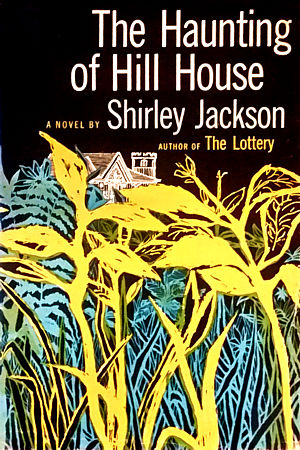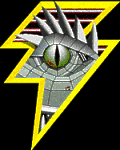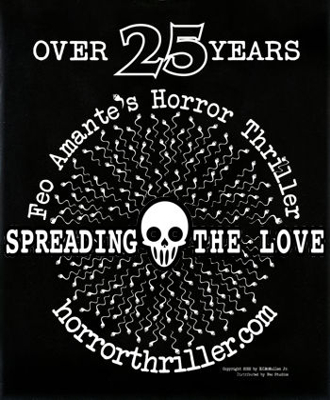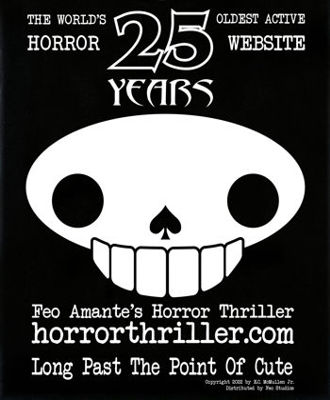 |
 |
Review by E.C. McMullen Jr. |
||

THE HAUNTING OF HILL HOUSE- 1959by Shirley Jackson USA Release: October 16, 1959 Viking |
||||
The first time I read Shirley Jackson's THE HAUNTING OF HILL HOUSE, I was about 12 years old. Honestly I didn't get as much out of it as I did Mary Wollstonecraft Shelley, Edgar Allen Poe, H.P. Lovecraft, or Stephen King.
I'd read it because I saw the movie on TV and enjoyed it. To my 12-year old mind, the movie was as faithful an adaptation as I'd known at that point (after having watched THE PLANET OF THE APES, I read the book and couldn't understand what the two had in common besides the title).
You would think that, due to my opinion, such a book wouldn't stay with me, yet it did.
Years later, as an adult, when I saw the 1999 version of THE HAUNTING, I left the theater disappointed. I felt the original book was so much better that it made the movie look like a Mad Magazine farce by comparison. So I read it again - as an adult.
Whew! Was this really the same story? Why didn't I notice this, that, and the other thing?
The obvious answer to me is, I was too young to understand the adult Horrors within THE HAUNTING OF HILL HOUSE.
Not to disparage the other aforementioned authors, but they could all plug into a child's mind, seemingly without effort, and scare me to the bone (depending on the story of course: King's The Library Policeman. Brrr!).
Shirley Jackson wasn't writing for kids. As she focuses on the thoughts only of the character Eleanor Vance, everyone else must speak to be heard, we're privy to a woman who has led an ugly, unloved life. All she has ever known is a paranoid and cruel Mother. One who separated her daughters between her first who she loved best and the youngest who was nothing more to her than a servant, and a poor one at that.
The older sister, Carrie, was given everything the Mother could offer, which wasn't much, with the prize only being her liberty to have her own life. Eleanor, however, reached adulthood as her Mother fell ill, and was given the sole task of taking care of her sickly Mother for 12 long years, until the time of the ingrate's demise.
As such Eleanor lived no life, acquired no job skills, and never earned the respect of her older sister, who lived her life as her Mother's favorite.
TRIVIAOf the various mysterious houses mentioned in THE HAUNTING OF HILL HOUSE, the Ballechin House burned down soon after the publication of Shirley Jackson's book. The Winchester Mystery House, 100 years old as of 2023, still stands as of this writing and you can take a tour. |
We meet Eleanor at 32 and sleeping on the couch of her sister's apartment: despised and controlled by her sister, her sister's husband, even her little niece Linnie. Eleanor has no friends, genuinely hates her sister (now that her Mother is dead), and dislikes her brother-in-law and her five year old niece.
We are introduced to Theodora, a beautiful young woman who, like all beautiful people, can afford to be capricious toward her friends because she knows she'll always be forgiven. If one is always forgiven, then what have they really done so wrong? Theo's neither mean or evil, she's only existed as a visually beautiful person her whole life and knows no other way. She doesn't know what its like to be abandoned for her rude behavior and is not always sure she is trying to be callous even when she is.
Writer Jackson doesn't hold back on the next person. In the first few sentences he's introduced as, "Luke Sanderson was a liar. He was also a thief." What Luke lacks in good looks, like Theodora, he amply makes up for in charm. "He was also apt to sell the watches and cigarette cases given him, fondly and with pretty blushes, by his aunt's friends."
This is how Jackson introduces us to the characters in her book and the first character she chose was Hill House itself,
"No live organism can continue for long to exist sanely under conditions of absolute reality; even larks and katydids are supposed, by some, to dream. Hill House, not sane, stood by itself against its hills, holding darkness within, it had stood so for eighty years and might stand for eighty more."
We are then introduced to Dr. John Montague, a doctor of Philosophy. All Ph.Ds are, that's what the "Ph" part is for. The D is for Doctorate/Degree and Montague's is in Anthropology.
Dr. Montague spent a lot of money and surrendered a lot of pride, to rent Hill House for three months while he carries out an experiment analyzing whatever supernatural manifestations may appear. He made a list of desirable research assistants and, using the most scrupulous methods he knew, whittled it down to about a dozen names. These people he invited to Hill House to stay all or part of the summer to help him with his research. He never actually came out and said the house was haunted, as he's a man of science. Only four people responded. Because Montague didn't own the house, he also found himself stuck with a representative of the family to watch over things and that's where the dissolute Luke Sanderson comes in.
On the day Dr. Montague was to leave for Hill House, two of his chosen assistants backed out, leaving only Theodora and Eleanor.
The novel follows Eleanor first as she goes through the trouble her sister Carrie imposes on her simply because it delights her. The favored sister has never known anyone to act with kindness toward Eleanor, her Mother set that in motion, and she sees no reason to change toward her little sister now that Mother is dead.
Tormenting Eleanor is what Mother would have wanted.
Eleanor has to behave like a thief to escape her sister's control and does so. On the long drive to Hill House, Eleanor attempts to free herself from the unwanted guilt of sneaking out from under her imposing sister's control while exhilarating for the first time in her newfound freedom. No matter what happens to her, good or bad, she will embrace it because she did it herself.
At the closed and locked gate she meets the grounds keeper, Mr. Dudley, and confuses his amazement at her for yet another person trying to tell her how to live. Mr. Dudley's curiosity comes from knowing where he is. Why would anyone want to enter the grounds, let alone the house, of their own free will? He attempts to explain but because Eleanor misread his intentions, she refuses to listen. She was invited by Dr. John Montague and she is going into Hill House.
When she sees Hill House for the first time, she's taken aback.
"The house was vile."
It stands resolute as a mountain and feels as if its staring down at her.
Once inside Eleanor must further deal with the housekeeper, Mrs. Dudley. Mrs. Dudley has a set of rules, all governing only her own behavior. There are things she will not do at the house, to the house, in the house, beyond a certain time. And at that hour she and her husband leave for the day and will not return until daylight.
Soon Theodora arrives and Eleanor, though shy by comparison, hopes Theo will become a friend: Her first friend. Dr. Montague and Luke arrive soon after and this makeshift family is complete. Eleanor can only imagine what a real, loving and happy family is like and puts it into her head that the four of them will become that.
Meanwhile strange and threatening things are happening in Hill House. On the first night,
"Around them the house brooded, settling and stirring with a movement that was almost like a shudder."
Nothing really takes off until deep into the second night.
Despite the frightening occurrences of the 2nd evening, the next day Dr. Montague isn't entirely sure that the episode can't be explained away by subterranean waters under the house, slowly affecting the ground perhaps, and causing the house to moan, grown, and knock (likely due to the uneven shifting of subsidence: a common problem for many houses built on ground above high water tables, especially in the 20th century and earlier, and particularly in valleys near hills and mountains).
All try to calm their nerves and even be happy with each other's company in Hill House. Which isn't easy because the very design of the place is so oppressive.
Shirley Jackson's attention to the tiny details of her characters, without dwelling upon them, keeps them interesting to learn about, appealing in their flaws, fascinating as well.
For example, Theodora is an expert at making people angry and does so when they are afraid, as Theo feels anger is preferable to fear.
Fear makes you cower. Anger makes you fight.
Luke, acting as cavalier as possible, feels obliged to assist Dr. Montague in running toward perceived danger as he doesn't want to look either weak or afraid in front of the women. However, his drinking increases and, while he doesn't go full blown drunk, his self-medicating gives him away.
Dr. Montague wants to be respectful, but given as he's a Professor and a teacher, comes across by habit as authoritative and fatherly toward the other adults.
For the four people who choose to live in Hill House, each night will get worse, with Eleanor herself becoming the target.
Or is she?
While Eleanor is convinced the house knows her name and wants something of her, the rest of the group is NOT convinced that Eleanor isn't doing at least some of these horrible things herself. There's just enough going on, an icy cold spot at the threshold of one room that can't be explained, or the temperature measured; the way the house appears to move its rooms and doors around; the knocking sounds so loud it seems as if the doors would blast from their frames, that keeps everyone guessing.
Eleanor can't be blamed for all of it, so is she really doing any of it?
Due to her life up to now, Eleanor can't tell if these people she wants for friends really like her, or are planning among each other to do something cruel to her. She feels the same about Hill House, at turns hating it and loving it: wanting to run away and wanting to stay forever.
Dr. Montague chose Eleanor and Theodora for a reason and those reasons were old newspaper reports of telepathic ability for Theo and terrible poltergeist activity surrounding Eleanor, when both were children.
Poltergeists don't manifest around adults, but has Eleanor ever had the chance to grow up?
Worse, while John attempts to soberly and authoritatively educate the others on the various documented types of psychic phenomena he has studied, there's one quite obvious type he seems to have missed. One that may be the very thing occurring right under their noses and happening to all of them.
Night after night the terrors build, each time worse than before, and exactly what Dr. Montague wanted for his research. Theodora and Eleanor want to leave but neither want to be the first: how can they show weakness when the men only seem intrigued by it all?
As the Horrors build toward crescendo, what will it finally take for Dr. Montague to realize he may have taken things too far?
Five Bookwyrms.





This review copyright 2023 E.C.McMullen Jr.
| GET SOME CLOTHES ON | |
FEO AMANTE'S HORROR THRILLERCreated by:E.C.McMullen Jr. FOLLOW ME @ |
| Amazon |
| ECMJr |
| Feo Blog |
| IMDb |
| Stage32 |
| YouTube |
| Zazzle Shop |

